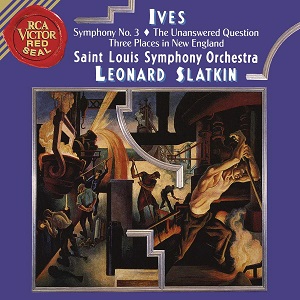
Charles Ives (1874-1954)
Three Places in New England (1903-1914)
March III with the Air “Old Kentucky Home” (1895)
The Unanswered Question (1908-1940)
Central Park in The Dark (1906)
Fugue in Four Keys on “The Shining Shore” (1896)
Symphony No. 3 “The Camp Meeting” (1901-1911)
Saint Louis Symphony Orchestra/Leonard Slatkin
rec. May 1991, St. Louis
Presto CD
RCA 09026-61222-2 [63]
Presto’s appraising eye has fallen again – and favourably – on RCA’s series with Leonard Slatkin. Here is a conductor who sprang from a long and honoured musical lineage: his father was Felix Slatkin, violinist, founder of the Hollywood String Quartet and conductor (Pristine). These recordings preceded his spell as Chief Conductor of the BBC Symphony Orchestra (2000-2004). The orchestra with which he worked in those days (1979-1996) was the Saint Louis Symphony. There he developed a most practical and redoubtable approach to British music and American music and did so in parallel with Gerard Schwarz (mostly American composers) for Delos, later Naxos. RCA-BMG supported Slatkin in multi-disc cycles of American and British music and in the complete symphonies of Vaughan Williams and Elgar. All these recordings with Slatkin helped to place the St Louis orchestra close to the active centre of the recording-buying public’s world.
Here is Slatkin’s Charles Ives collection which was first issued in 1992. Ives was allocated just one Slatkin disc (the same goes for his Piston and Schuman) whereas he was allocated three for Copland. The sound achieved by the RCA team in St Louis’ Powell Symphony Hall, is very civilised: plush and silky without being glaringly spectacular.
Slatkin makes play with Three Places in New England, which is variously temperate and, in the middle section, quite intemperate, being disrupted by touches of sentimentality and chaos. A spring in the bumptious step – Souza-style – is more than evident in March III with the Air “Old Kentucky Home”. Fugue in Four Keys on “The Shining Shore” takes a more contemplative line. The next two pieces, each well known, again present the composer’s more subtle and oblique face. With its whisper quiet mysteries The Unanswered Question ruminates and meditates. The solo trumpet suggests Ives might well have heard some orchestral Scriabin such is its mystical tension which, in the composer’s words, portrays “The silences of the Druids”.
Central Park in The Dark continues the devastated wasteland theme. Premiered as late as 1946 the three-movement Third Symphony “The Camp Meeting” is heard here in very honest sound and in a performance that captures this sturdily transfixing music’s alternating ascent from earnest hymnal to ecstatic possession, intensity to calm and back again. It’s all very centred and stable yet preserves the spiritual and animated aspects which thread their way through some sustained string writing and lambent playing. The Third Symphony has been recorded quite a few times. This has on occasion been part of complete cycles of Ives’ four numbered symphonies. I have not heard the Litton cycle from Hyperion at all nor have I recently heard the Tilson Thomas set from Sony. However, should you wish for the Third Symphony with some of the shorter and even more familiar works, then this satisfying recital is well worth having and may be all the Ives you would want.
The notes are by Richard Freed and the cover design is like all of the present series illustrated with detail of vivid paintings from the 1930s. This was an era when state and federal legislatures got behind publicly commissioned art designed to hymn the industrial and scientific wonders of the new century. It’s almost Soviet in its exciting colours and subjects. In this case the artwork is from “Steel” (from ‘America Today’) by Thomas Hart Benton.
A satisfying recital that is strong on earnest integrity.
Rob Barnett
Help us financially by purchasing from




















